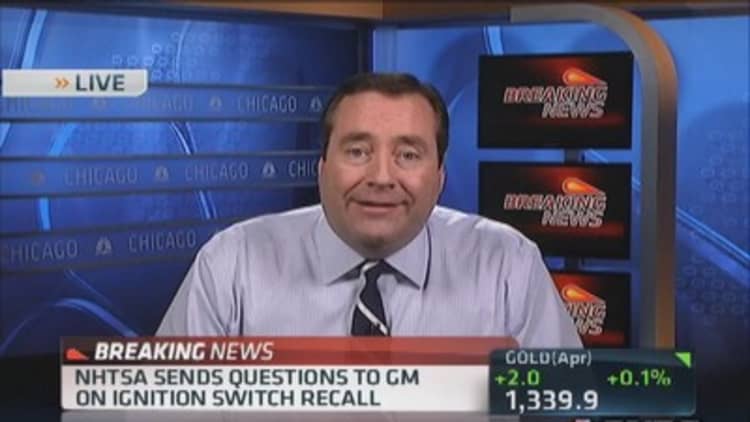Less than two months after taking over General Motors and being hailed as a sign of how much the country's largest automaker has changed, CEO Mary Barra is facing a huge test.
Can she steer GM through a recall investigation that threatens to damage the automaker's reputation?
The automaker's latest headache is how it handled the recall of 1.37 million vehicles sold in the U.S. with a faulty ignition key. Some of those keys, while in the ignition, could inadvertently move out of the "run" position, turning off the engine and some of the electrical components. One of the side effects was that the airbags could unintentionally be turned off.
According to the National Highway Traffic Safety Administration, there have been 31 accidents and 13 deaths related to the faulty keys.
(Read more: )
For GM, the issue—which involves 2003 to 2007 models—dates to 2004, when questions about the key surfaced. But it wasn't until early in 2014 that the automaker issued a recall. That time lag is at the heart of a special order from the legal counsel office at the NHTSA
What did GM executives know?
When did they know it?
And did they move as quickly as the law requires to issue a full recall of the ignition keys?
(Read more: )
Those are just a few of the questions the agency wants GM to answer. In a letter sent to the automaker on Tuesday—requesting detailed answers to 107 questions related to the recall—it's clear federal investigators are not treating this probe as a routine inquiry. NHTSA wants answers, and it wants them by April 3.
Barra knows just how serious the investigation is for her company. The same day NHTSA sent its list of questions to GM, she announced the automaker had "launched an internal review to give us an unvarnished report on what happened."
In a letter to employees, Barra said, "First and foremost, everything we are doing is guided by one unwavering principle: Do what is best for our customer. Customer safety and satisfaction are at the heart of every decision we make."

There's no reason to believe Barra is not sincere. She knows General Motors has to move quickly to stop the lingering questions about the safety and quality of its models.
It didn't help matters that Alan Batey, the new president of GM's operation in North America, issued a statement in late February, saying GM's handling of the recall investigation "was not as robust as it should have been."
Allan Kam, a former senior enforcement attorney for NHTSA who is now an automotive safety consultant, said the latest moves by federal investigators were noteworthy.
"This is not a routine inquiry," Kam said. "I've never seen a special order from NHTSA this detailed."
Lingering impact for GM?
Since GM issued the first recall for ignition keys in early February, the story has festered and steadily gained more attention. It has prompted GM to twice issue public apologies, where the company has said the recall is not an indication of how the automaker wants to conduct business.
On paper that sounds good. In reality, the NHTSA inquiry casts serious doubt on GM's claims.
It's unclear what impact the recall has had on sales, as harsh winter weather has hurt business for all automakers. The company most recently reported a sales dip of 1 percent in the month of February.
(Read more: )
In any case, Barra and her leaders need to move quickly to end the ongoing questions about the safety of GM cars and trucks.
It doesn't matter that the models in question with this recall are no longer being built.
What matters is the perception, fair or not, that General Motors dragged its feet announcing a recall surrounding the deaths of 13 people.
When Barra was selected as CEO, many said it was symbolic of the new GM. She was held up as the hope GM would drive even further from the bad habits that tarnished its reputation before it slid into bankruptcy.
Ironically, it's the actions of GM in those "pre-bankruptcy" years—when it was known as a slow-moving conglomerate that reacted slowly to change—that are now haunting the automaker and its new chief.
—By CNBC's Phil LeBeau. Follow him on Twitter @LeBeauCarNews.
Questions? Comments? BehindTheWheel@cnbc.com.


